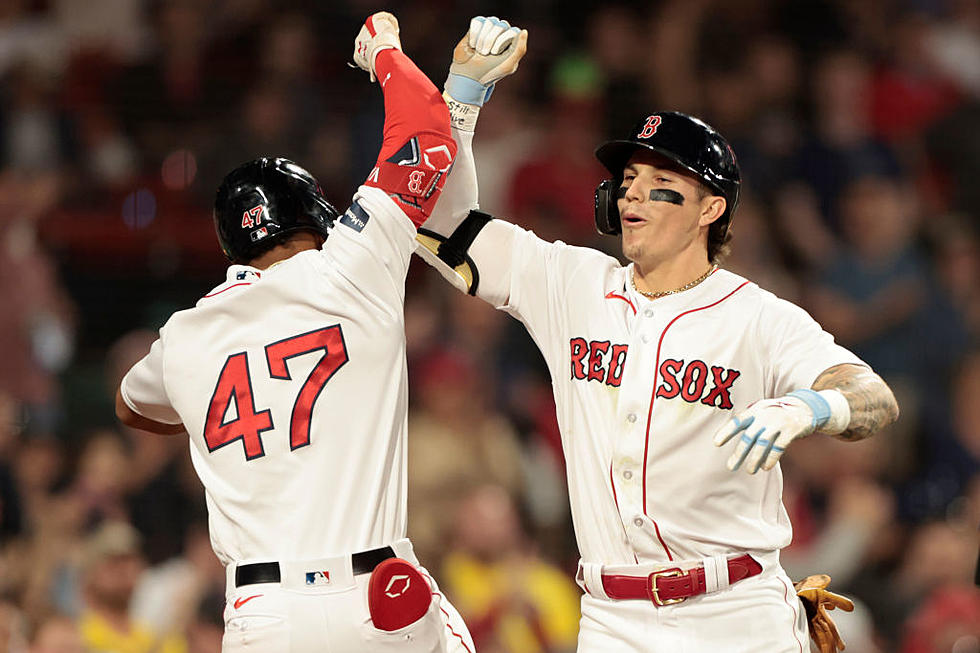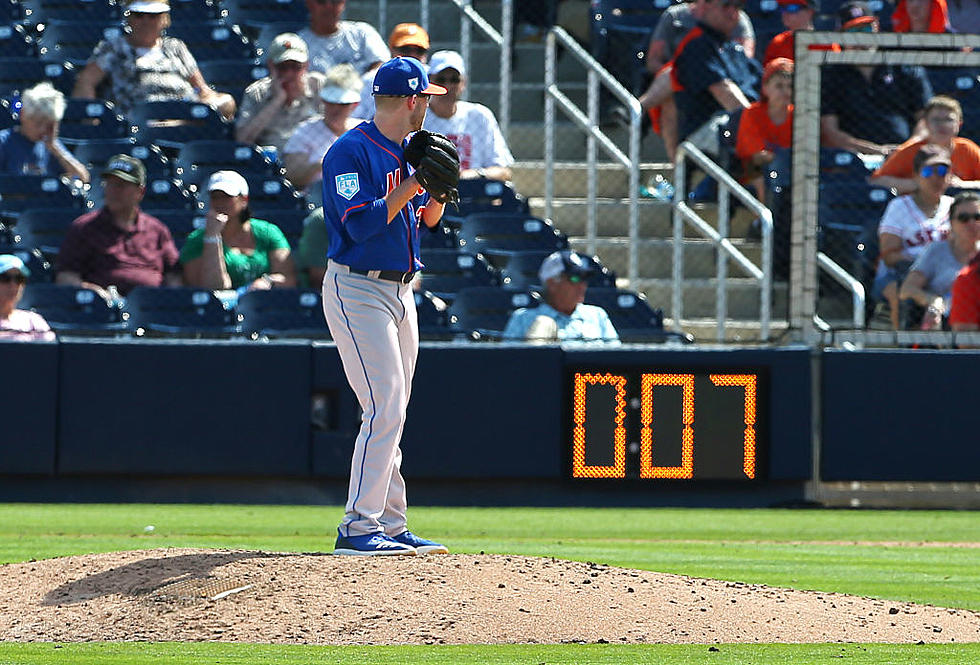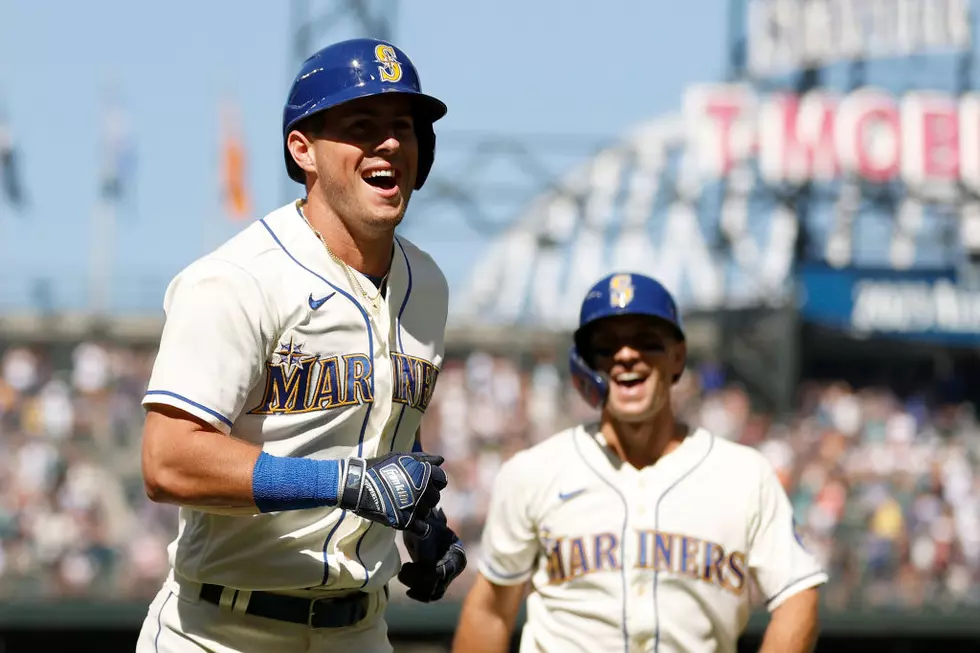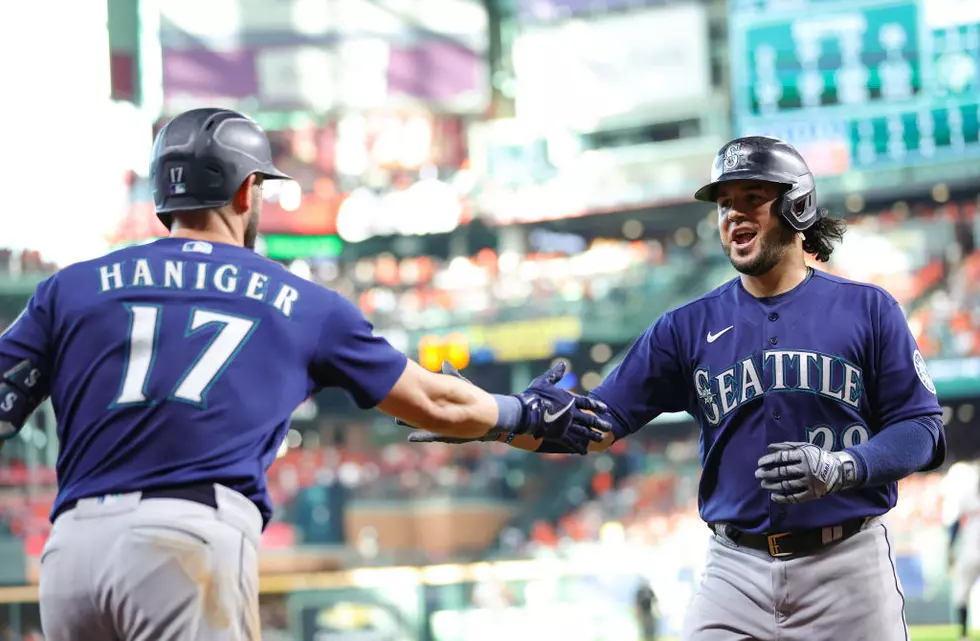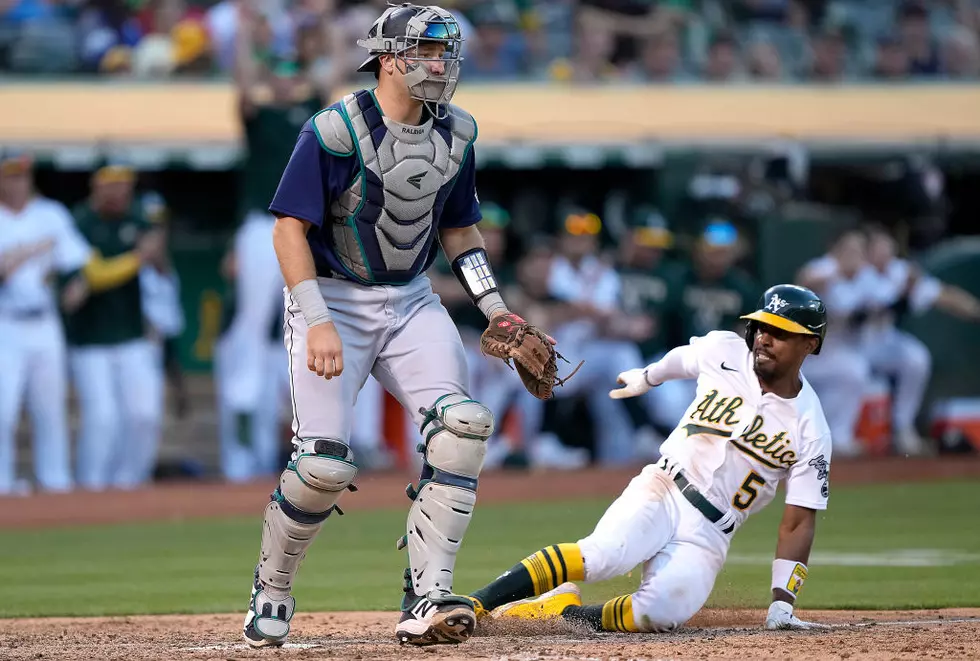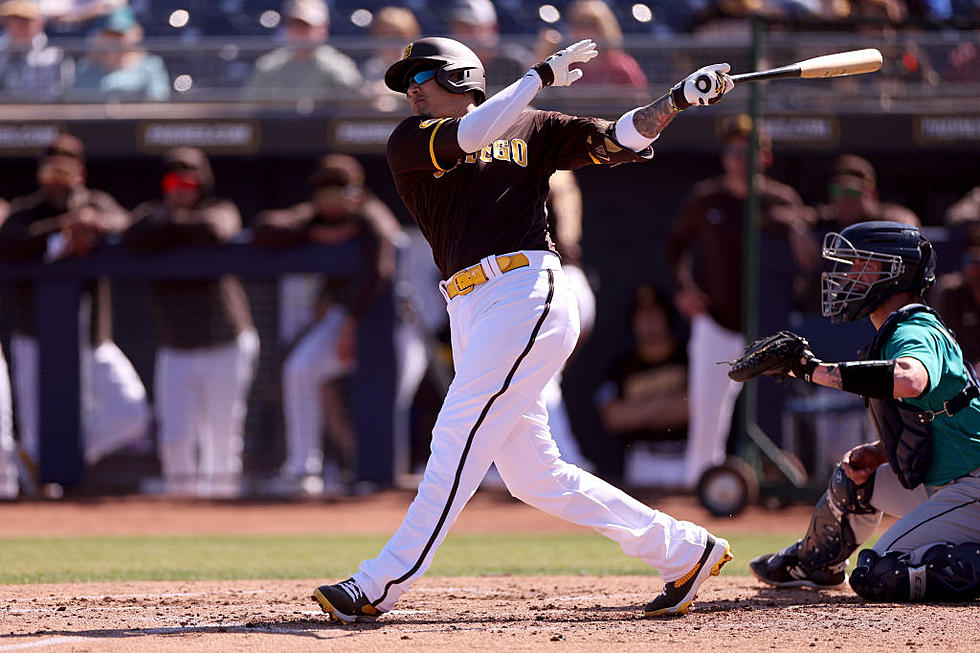
Padres’ Machado and Brave Conley Draws First Pitch Clock Violation
Tick, tock, Manny Machado. Better watch that pitch clock.
Baseball’s new timing device made its big league debut Friday during a limited schedule of spring training openers and wouldn’t you know it, it was Machado, the San Diego Padres’ All-Star slugger, not a pitcher, who was called for the first violation.
Machado found out the hard way that the pitch clock works both ways. He wasn’t fully in the batter’s box and facing Seattle Mariners left-hander Robbie Ray as the 15-second clock wound under 8 seconds in the bottom of the first inning in Peoria, Arizona. Umpire Ryan Blakney called time and signaled strike one against Machado, who finished second in last season’s NL MVP race.
Machado was hardly fazed. He singled on a 2-1 pitch and then collected another single his second time up.
Machado, who batted between fellow superstars Xander Bogaerts and Juan Soto, laughed about it afterward.
“Going into the record books, at least. That’s a good one. Not bad," Machado said. “I might just be 0-1 if I can get two hits every game.”
If Major League Baseball was looking for immediate results from the new rules designed to improve pace of play, including the pitch clock, it got them. The Mariners won 3-2 in 2 hours, 29 minutes, which is fast for any game, spring or regular season. In nearby Surprise, the Kansas City Royals beat the Texas Rangers 6-5 in 2:33.
Padres manager Bob Melvin said he walked over to MLB officials Morgan Sword and Mike Hill afterward and said: “If this is going to be the pace of these games, I’m OK with it.”
The game "felt really fast at the beginning. Guys were looking at the clock, Manny makes history with the first infraction in major league history, another feather in his cap,” Melvin quipped. "During the course of this game we acclimated a little bit. So far, so good.”
With the pitch clock, players will have 30 seconds to resume play between batters. Between pitches, pitchers have 15 seconds with nobody on and 20 seconds if there is a baserunner. The pitcher must start his delivery before the clock expires. After a pitch, the clock starts again when the pitcher has the ball back, the catcher and batter are in the circle around home plate, and play is otherwise ready to resume.
Batters must be in the box and alert to the pitcher with at least 8 seconds on the clock. Batters can call time once per plate appearance, stopping the countdown.
When a pitcher doesn’t throw a pitch in time, the penalty is an automatic ball. When a batter isn’t ready in time, it’s an automatic strike.
“That time came by quick," Machado said. “It’s definitely something we’re going to have to get used to. It kind of takes away your routine, being up there and zoning in before the pitch. The umpire gave me a little warning — ‘Hey, you got two seconds’ — but I was already late when I got in there.”
“You got 30 seconds and you got to be ready by eight. Forget about walk-up songs for real," he added with a laugh. “It’s going to be interesting. I always tap the umpire for respect. Those things will start going out of the way.”
Batters can't leave the box between pitches, “which I don't mind,” Machado added. “You can just keep a foot in the box and gather yourself again.”
“Getting to the box is where it’s going to speed up guys," Machado said. "Even pitchers, if you’re down 2-0 how are you going to catch a break and lock yourself back in without getting penalized? It’s the same thing going up there when you’re hitting.
"It’s going to be an interesting year. It’s going to be fun. Who knows where this leads? There’s going to be a lot of strategy that goes into this.”
Machado will play for the Dominican Republic in the World Baseball Classic, which won't have a pitch clock.
“I’m going to take my time," he said.
Padres starter Nick Martinez added that the clock will make things "a little tricky. Got to find some areas that I can save some time so I can get some time when I need it.”
Martinez said the clock will affect how pitches are called.
“Today the way to alleviate the pressure was having the PitchCom with me,” he said. “For the majority of the time (Luis Campusano) was calling the game but if I had a pitch that kind of stood out for me I just pressed it. I didn’t wait for him to call it, I was like ‘I want this one.’ I did it a few times. There are times when I like to slow the game down, so that’ll be interesting."
Melvin said pitchers and batters will have to adjust as spring training moves along, especially those who go to the WBC and then return to MLB's new rules.
“The one thing, guys are going to get a little bit tired working at this pace," Melvin said. "Whether it’s starters, relievers throwing a lot of pitches, there’s going to be an endurance factor with this as well.”
RANGERS-ROYALS
Texas left-hander John King was called for a pitch clock violation in the bottom of the fifth, changing the count from 1-2 to 2-2. Umpire supervisor Mike Everitt was in the press box watching to see how the umpires were implementing the new rules as well as how the clock operators were doing. “That is a big job,” Everitt said.
MORE PITCH CLOCK MUSINGS
New York Yankees manager Aaron Boone said he’s looking forward to the pitch clock when the Bronx Bombers open their spring schedule Saturday against the Philadelphia Phillies in Clearwater, Florida. The Yankees have had Triple-A umpires working the plate during simulated games.
“I think these last few days, grateful for the umpires that have come out here and helped us out in that regard," he said. "I think it has been really valuable. It’s sparked more conversation around it, but now to get to start applying it in games obviously will serve us well. It’s important to get going.”
BIGGER BASES
Machado said the new bases, which are now 18-square inches, up from 15 inches, "weren't too bad. I like the big base. They've got to be a little more consistent with how they were last year, the firmness, the grip of it. I definitely like the new ones with the bigger size.”
Conley's pitch clock violation leaves Braves-Red Sox tied
Game over. Conley, apparently thinking he had been awarded an automatic ball four, couldn't believe it. He pointed to himself and said, “Me?” His teammates couldn't believe it, either. Fans booed.
Welcome to 2023, where baseball’s new rules designed to improve pace of play are coming fast at everyone, particularly the players.
The most dramatic moment of the new pitch clock era arrived on the first full day of spring games, and in the most dramatic scenario possible. Conley, facing reliever Robert Kwiatkowski of the Boston Red Sox, wasn’t set in the box and alert to the pitcher as the clock wound under eight seconds.
The penalty is an automatic strike, which led to the game at North Port, Florida, finishing in a 6-6 tie. Kwiatkowski got the strikeout after throwing only two real strikes.
It was a far more dramatic moment than when San Diego Padres slugger Manny Machado on Friday became the first player to draw a pitch clock violation when he was called for an automatic strike in the bottom of the first inning against Seattle because he wasn���t set in the box in time.
The pitch clock is one of the new rules designed to speed pace of play. Players will have 30 seconds to resume play between batters. Between pitches, pitchers have 15 seconds with nobody on and 20 seconds if there is a baserunner. The pitcher must start his delivery before the clock expires. After a pitch, the clock starts again when the pitcher has the ball back, the catcher and batter are in the circle around home plate, and play is otherwise ready to resume.
MORE SIGN STEALING?
Could the pitch clock lead to more on-field sign stealing, in turn forcing managers to cut out the third base coach as the middleman for relaying signs?
Veteran managers Dusty Baker and Buck Showalter think so.
It’s an interesting point from Baker, considering that he took over as Houston’s manager in 2020 after A.J. Hinch was fired following the stunning revelation that the Astros had illicitly stolen signs in 2017, when they won the World Series, and again in 2018.
“I’m concerned about that because you’re always aware of people stealing signs,” Baker said Saturday when his defending World Series champion Astros beat Showalter’s New York Mets 4-2 in West Palm Beach, Florida. “And then there’s the sensitive area. OK, are you cheating? Is that part of the game, stealing signs? If I know you’re hitting and running that’s what I’m supposed to do.”
Baker said there’s less time for the dugout to signal the third base coach, who in turn must relay signs to batters and runners, and therefore less time for to use decoys, making the signs easier to decipher.
Baker believes the pitch clock puts even more pressure on the third base coach to be quick — and somewhat deceptive. On the other hand, the pitch clock also limits the amount of time defenses have to react, even if they know a hit-and-run or bunt is coming.
Baker said the toughest job on the field is being a third base coach. “Everybody in the ballpark has eyes on him. Everybody’s trying to decipher his sequence of signs. There are guys in the stands, are guys now on videos. I mean, if you know what the opposition is going to do, that makes it even tougher to do. Yeah, I’m concerned about that.”
Showalter shares Baker’s concern to the point that he’s considering eliminating the middleman and having all signs come directly from the dugout, a practice common in the amateur ranks.
“There are so many things that, because we’re afraid to copy colleges or high schools because, ‘Oh, they’re amateurs and we’re pros,’ ” Showalter said. “There are things they did better. They don’t go through the third base coach. Why do we transfer stuff to a third base coach to then transfer to the player? It’s just another relay.”
A HOMER AND A VIOLATION
Los Angeles Angels outfielder Jo Adell used his one aloted timeout during his at-bat in the second inning, and then on the next pitch launched a long two-run homer to left off Seattle lefty Marco Gonzales. In his final at-bat, he drew a violation for strike two by plate umpire Mike Muchlinski and eventually struck out.
“I was trying to figure out how many timeouts before a strike, so I wanted to make sure I didn’t call another one,” Adell said. “The following at-bat I ran into seven seconds and got a strike called. I think it’s fine, we’ll all get into the rhythm of it, there’s going to be a few violations here and there.
HOME PLATE TENSION
St. Louis Cardinals manager Oliver Marmol said umpire C.B. Bucknor “has zero class” for refusing to shake his hand during the lineup card exchange at home plate before a game against the Washington Nationals. Marmol, who did shake hands with the other three umps, was seeing Bucknor for the first time since being ejected in a contentious dispute Aug. 21 in Arizona.
“I went into that game pretty certain of my thoughts on him as an umpire,” Marmol said. “They weren’t very good and it shows his lack of class as a man. I chose my words wisely. I just don’t think he’s good at his job and it just showed his lack of class as a man.”
Marmol was ejected last year in the final game of a series after protesting a strike call by Bucknor against Nolan Arenado, with each loudly questioning the other’s “time in the league.”
Bucknor was not available after Saturday’s game and did not return a reporter’s telephone call.
BRYANT ON THE MOVE
Colorado Rockies slugger Kris Bryant’s first spring training game this season included more running that he expected. The 31-year-old is trying to bounce back after missing a big chunk of the 2022 season with various injuries, including to his right foot. He hit .306 with five homers in 42 games.
Bryant reached first base on a fielder’s choice in the first inning against the Diamondbacks. He then scored from first base on Ryan McMahon’s double to the wall.
“I felt fine running, I just felt slow,” Bryant said, laughing. “But I figure for the first time in spring training doing that, it’s a good test for me."
SONG THROWS
Phillies right-hander Noah Song threw off a mound during his third day of workouts after joining the team from the U.S. Navy and said the session was “good.” The 25-year old had been a flight officer training on a P-8 Poseidon maritime patrol and reconnaissance aircraft before he was allowed to transfer from active duty to reserves.
Song was impressive in his only pro season, making seven starts for Boston’s Class A Lowell affiliate in 2019, striking out 19 in 17 innings with a 1.06 ERA. With a fastball in the upper 90s mph, he went 11-1 with a 1.44 ERA and 161 strikeouts in 94 innings during his senior year at Navy.
The Phillies selected Song from the Phillies in the December draft for unprotected minor league players.
More From 600 ESPN El Paso
